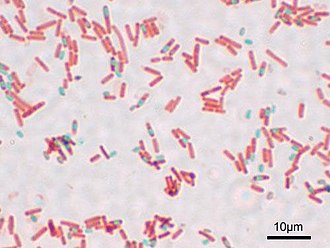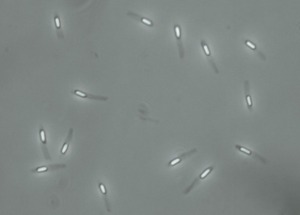Endospore
A detailed overview of bacterial endospores




An endospore is a dormant, tough, and non-reproductive structure produced by certain bacteria from the Firmicutes phylum. The primary function of most endospores is to ensure the survival of a bacterium through periods of environmental stress. Endospores are resistant to ultraviolet and gamma radiation, desiccation, lysozyme, temperature, starvation, and chemical disinfectants. They are commonly found in soil and water, where they may survive for long periods of time.
Formation[edit]
Endospore formation, or sporulation, is a complex process that occurs when a bacterium encounters unfavorable conditions. The process begins with the replication of the bacterium's DNA, followed by the formation of a septum that divides the cell asymmetrically. The smaller compartment, known as the forespore, will become the endospore, while the larger compartment, the mother cell, will eventually lyse and release the mature endospore.
The forespore is engulfed by the mother cell, and a series of protective layers are formed around it. These layers include the cortex, which is made of peptidoglycan, and the spore coat, which is composed of proteins. The core of the endospore contains the bacterium's DNA, ribosomes, and large amounts of dipicolinic acid, which helps stabilize the DNA and proteins.
Resistance[edit]
Endospores are highly resistant to environmental stresses due to their unique structure. The spore coat provides a physical barrier to chemicals and enzymes, while the cortex helps maintain the spore's dehydration, which is crucial for its resistance to heat and radiation. The presence of dipicolinic acid and calcium ions in the core also contributes to the endospore's resistance by stabilizing the DNA and proteins.
Germination[edit]
When favorable conditions return, endospores can germinate and return to their vegetative state. Germination involves the uptake of water, swelling of the spore, and the breakdown of the spore coat. The bacterium then resumes normal metabolic activity and growth.
Significance[edit]
Endospores are of great significance in the medical and food industries due to their resistance to sterilization methods. They can survive in extreme conditions that would kill most vegetative cells, making them a challenge to eliminate. This resistance is particularly important in the context of Clostridium botulinum, the bacterium responsible for botulism, and Bacillus anthracis, the causative agent of anthrax.
Also see[edit]
| Microbiology: Bacteria | ||||||||||||||||||||||||
|---|---|---|---|---|---|---|---|---|---|---|---|---|---|---|---|---|---|---|---|---|---|---|---|---|
|
| Microbiology | ||||||||||
|---|---|---|---|---|---|---|---|---|---|---|
This microbiology related article is a stub.
|
Ad. Transform your life with W8MD's Budget GLP-1 injections from $75


W8MD offers a medical weight loss program to lose weight in Philadelphia. Our physician-supervised medical weight loss provides:
- Weight loss injections in NYC (generic and brand names):
- Zepbound / Mounjaro, Wegovy / Ozempic, Saxenda
- Most insurances accepted or discounted self-pay rates. We will obtain insurance prior authorizations if needed.
- Generic GLP1 weight loss injections from $75 for the starting dose.
- Also offer prescription weight loss medications including Phentermine, Qsymia, Diethylpropion, Contrave etc.
NYC weight loss doctor appointmentsNYC weight loss doctor appointments
Start your NYC weight loss journey today at our NYC medical weight loss and Philadelphia medical weight loss clinics.
- Call 718-946-5500 to lose weight in NYC or for medical weight loss in Philadelphia 215-676-2334.
- Tags:NYC medical weight loss, Philadelphia lose weight Zepbound NYC, Budget GLP1 weight loss injections, Wegovy Philadelphia, Wegovy NYC, Philadelphia medical weight loss, Brookly weight loss and Wegovy NYC
|
WikiMD's Wellness Encyclopedia |
| Let Food Be Thy Medicine Medicine Thy Food - Hippocrates |
Medical Disclaimer: WikiMD is not a substitute for professional medical advice. The information on WikiMD is provided as an information resource only, may be incorrect, outdated or misleading, and is not to be used or relied on for any diagnostic or treatment purposes. Please consult your health care provider before making any healthcare decisions or for guidance about a specific medical condition. WikiMD expressly disclaims responsibility, and shall have no liability, for any damages, loss, injury, or liability whatsoever suffered as a result of your reliance on the information contained in this site. By visiting this site you agree to the foregoing terms and conditions, which may from time to time be changed or supplemented by WikiMD. If you do not agree to the foregoing terms and conditions, you should not enter or use this site. See full disclaimer.
Credits:Most images are courtesy of Wikimedia commons, and templates, categories Wikipedia, licensed under CC BY SA or similar.
Translate this page: - East Asian
中文,
日本,
한국어,
South Asian
हिन्दी,
தமிழ்,
తెలుగు,
Urdu,
ಕನ್ನಡ,
Southeast Asian
Indonesian,
Vietnamese,
Thai,
မြန်မာဘာသာ,
বাংলা
European
español,
Deutsch,
français,
Greek,
português do Brasil,
polski,
română,
русский,
Nederlands,
norsk,
svenska,
suomi,
Italian
Middle Eastern & African
عربى,
Turkish,
Persian,
Hebrew,
Afrikaans,
isiZulu,
Kiswahili,
Other
Bulgarian,
Hungarian,
Czech,
Swedish,
മലയാളം,
मराठी,
ਪੰਜਾਬੀ,
ગુજરાતી,
Portuguese,
Ukrainian